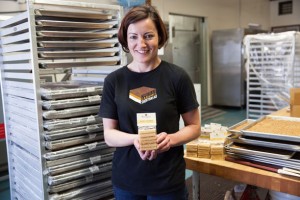The post Business skills and lessons learned appeared first on Paul Terry & Associates.
]]>Do your business skills match your business’ complexity?
I recently shared six tips on this topic and asked other small business owners about their experiences. How did their business skills match the complexity of their business when they first opened? How have they dealt with this tension throughout their business’ evolution? What advice would they want to share with others?
In previous posts Heidi Gibson of The American Grilled Cheese Kitchen and Rachel Saunders of Blue Chair Fruit shared their stories with us. Here are two more business owners tackling complex issues and leveraging their management skills.
Elizabeth Leu
Fiddlesticks
When Elizabeth Leu started Fiddlesticks, a children’s boutique in Hayes Valley, she thought she was prepared. She first worked for someone else and learned as much as she could about the retail business. Elizabeth also took the Renaissance Entrepreneurship Center Business Planning class.
She started her business with a solid foundation of hands-on experience, working for others, and thoughtful planning. Yet she couldn’t prepare herself for what it would actually feel like when she was completely responsible for her own business and all its complexities.
“As a small business owner you have to be the master of all in everything you do, and that’s not easy. You have to wear ALL the hats and ideally, they should all fit. I think management capacity is finding the correct fit with all those hats — and that’s hard! It takes a lot of time and experience to get them all to fit.”
Elizabeth’s advice:
Learn as much as you can about every role in your business.
“You may love only a few of those hats but you have to figure out, master and tolerate them all — at least in the beginning until you can outsource. Once you get strong enough to outsource, you still need to understand how it all works to keep a watchful eye on the whole operation.”
Stay positive and just keep going.
“I have worked very hard to grow my business and I have had some significant setbacks. With every setback I can either choose to learn from it or become bitter and harbor frustrations. I have worked hard to learn from them. All of the setbacks were complex and difficult, especially because it was uncharted territory for me. But I learned and I am still learning. What is it they say, ‘two steps forward, one step back’? As long as you move forward, business complexity feels easier because you keep breaking it down, tackling it piece by piece.”
Claire Keane
Clairesquares
Claire Keane, owner of the artisan, handcrafted sweet treats company Clairesquares, says that her business skills did not match the complexity of her business when she started. She had a steep learning curve. But Claire gained the skills she needed by seeking out specific business knowledge and support and her daily experiences in business brought many lessons learned.
Claire’s key steps for developing core business skills:
Write a business plan.
Claire took the 14-week Business Planning Class at the Renaissance Entrepreneurship Center and wrote a business plan. “To this day, I frequently remember key pointers from each class.”
Join an incubator.
Claire joined La Cocina’s Incubator Kitchen and received the help of that community and all their support services.
Attend lots of workshops.
Claire learned from others to increase her skills. “Whenever there was a workshop relevant to my lack of skills, I made sure to attend it. I was able to take tips from each training and apply it to my business immediately.”
Develop a support team.
Claire knew that she could not do it all alone. “It was very helpful to have a business mentor, new business friends with similar start-up business pains and other friends and family to lean on for advice to get me through the learning curve.”
Keep at it, even through failure.
Ultimately it has been Claire’s tenacity and her perseverance that has made her business a success. “No amount of workshops can prepare you for real world experience. In the end, I learned from trying, failing, and trying again.”
Check out these additional tips on balancing business skills with business complexity. What has worked for you and your business?
The post Business skills and lessons learned appeared first on Paul Terry & Associates.
]]>The post Defining success appeared first on Paul Terry & Associates.
]]>There is a lot we can learn from other small business owners.
I recently shared six key considerations for matching business skills with the complexity of a business. Then I shared advice from Heidi Gibson of The American Grilled Cheese Kitchen. Now, here is some advice from another successful small business owner…
Rachel Saunders
Blue Chair Fruit
Rachel Saunders would describe herself as a complete neophyte when she started Blue Chair Fruit. But, “what I lacked in experience, I had in determination. Also, I had several bosses who were terrible managers and their negative examples helped orient me towards how I did NOT want to be!”
As Rachel’s business grew she realized that she had to pay attention to her business structure. Instead of thinking about her business just in terms of herself or the people who worked for her at the moment, she started to focus on key roles and how they functioned together to support the business. “Once I was able to step back and look at the staffing structure of my business, I was able to manage in a way that made more sense.”
Learning how to stream-line the business’ operations in general was also an important learning for Rachel. “Big corporations can afford to have extra staff or waste, but a small or micro business cannot! Over time, I was able to streamline things dramatically. A leaner business is a stronger business, as long as everything is getting done!”
At one point Blue Chair Fruit Company was selling at eight farmers’ markets a week. This was great exposure but ultimately not the most profitable sales channel. “I realized that selling more product through a wholesale distributor, despite the lower profit margin, was actually a much cleaner, easier way to do business. Since we scaled down to our three best farmers’ markets, our bottom line has improved!”
Rachel’s advice for success:
Take a step back and ask yourself if everything you are doing in your business is really necessary.
Determine what is actually working and worth the effort. Scaling up is not always the answer. Sometimes your business should be scaled back to increase profitability. Look at your staffing. Be clear about when and where you need the help. How can jobs be structured to maximize efficiency?
Keep track and analyze your data.
Understand what activities lead to better returns. Don’t commit yourself to a sales channel where you aren’t making any money. Exposure alone isn’t good enough!
For Rachel and many other small business owners, business growth isn’t just about getting bigger. It’s about developing the right business model and scale for success. What does business success mean to you?
Check out Heidi Gibson’s advice for small business owners and my six tips for matching business skills to business complexity.
The post Defining success appeared first on Paul Terry & Associates.
]]>

